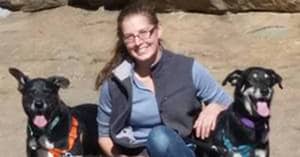April 2016 KPA CTP of the Month
You might say that Kelsi Skee, KPA CTP, CPDT-KA, was brought up to work with animals—and to complete the Karen Pryor Academy (KPA) Dog Trainer Professional (DTP) program! When she was eleven years old, Kelsi and her rescued blue healer (Hobo) started a training program along with her mother and her mother’s golden retriever. Kelsi’s dog Hobo had a damaged trachea from being chained up most of his life, so Kelsi “never bought into traditional training, and subsequently flunked out of that program!” Shortly after that class, Kelsi’s mother discovered clicker training.

At the age of 14, Kelsi began to work in the kennels of the animal-boarding facility run by her mother, Gail Skee, KPA CTP. “My mother is the reason I got into training,” says Kelsi. “While I worked for her, I learned a lot while she was going through the KPA DTP.” Some of that information Kelsi was able to use to help the two reactive dogs she acquired before turning 18. “As my mom shared with me what she was learning about positive training, my interest in working with animals increased.”
As a senior in high school Kelsi interned at a wolf sanctuary, working directly with the animals. She fed, transported, trained, and cleaned up after the animals, some of which were wolf hybrids. In addition, Kelsi was able to teach some of the animals how to walk on leash so that they could be handled by vets, moved to different locations when maintenance had to be done to one area, etc.
Through college she worked as a groomer, using positive methods throughout each session. Kelsi enrolled in as many animal-behavior classes as possible earning her BS in biology. During her last semester of college, Kelsi applied to and was accepted by the KPA Dog Trainer Professional program. Conveniently, she participated in an internship program at the El Paso Zoo at the same time.

I was able to do a good bit of training with some of the animals there.

Kelsi says that one of the most important lessons from her KPA experience was learning about the versatility, the sheer number of different applications, positive training had to offer for both humans and non-humans. “The many valuable teachings presented to me throughout the KPA program were humbling. I was almost embarrassed I hadn’t already come to the conclusions on my own,” says Kelsi. “It all makes sense.”
Learning how to look at an animal’s behavior objectively strengthened Kelsi’s relationships with her own animals. “I had insight about how to change my own behavior and actions.” Her KPA experience and KPA CTP designation helped in what Kelsi calls “an eye-opening experience” working as an animal trainer at a humane society in Memphis, TN. Her time there was emotionally taxing, but “what began as adversity bred an opportunity to work through new and challenging situations with both human and non-humans.” Although the initial buy-in and cooperation from staff and volunteers were very low, Kelsi was able to create a training and enrichment program at the humane society, along with a color-coded system for the dogs in residence corresponding to appropriate volunteer capability levels. “I was happy to find out that three of my volunteers from the human society were attending the 2016 ClickerExpo in Cincinnati, and that my program is still going strong, says Kelsi.
In Memphis, Kelsi became a docent at the Memphis zoo and taught children (and adults) about the zoo’s conservation, behavior, training, and enrichment at the facility. She continues to volunteer her time to behavioral training programs. Beginning April 8, Kelsey will lead a short animal-behavior class through the Western Institute of Lifelong Learning at Western New Mexico University. Her class will include hands-on work with chickens as well as with humane society animals.
Currently, Kelsi works full time in administration for a (human) medical clinic.

I am trying to use TAGteach methods to modify workflows, employee behavior and training, and customer service.

On the side, Kelsi is busy with many other forms of work. She offers training classes and staff training at her mother’s facility, teaches yoga (acro, aerial, hatha, and vinyasa), volunteers as a foster for the local humane society, and leads the animal-behavior class at the university. Kelsi says that she is “working up to working with my mother’s horses again.” Facing this impressive list of commitments, Kelsi admits, “I am getting married in June, so time has been a bit tighter than usual.”
As a yoga instructor, Kelsi finds that some of the KPA and TAGteach methods she learned coincide with concepts that she emphasizes to her students. “I am forever grateful for all KPA has brought to me and taught me. My KPA experience has affected how I interact in personal relationships (both positive and negative in nature).” With continued and consistent insight into her own personal growth and challenges, Kelsi has found new perspectives and areas for personal behavior modification.
Kelsi’s future plans include venturing into some laboratory research and earning a master’s degree in clinical social work. “I would like to bring mindfulness, TAGteach, and other ‘clickerly’ methods into a clinical practice.” Kelsi envisions her practice including animal therapy and a yoga studio where she will utilize short phrases and TAGteaching in her classes. Reaching out further, Kelsi hopes to one day develop her skills and outlook to a level where she can work to help humans with behavior disorders, such as anxiety, PTSD, depression, OCD, addiction, autism, and more. “Of course, this help will always be offered to the non-human animals, too!”

